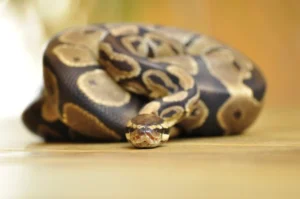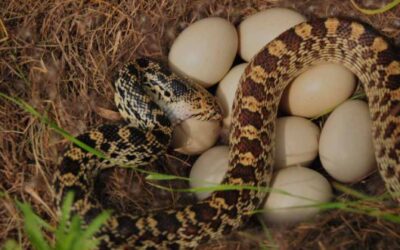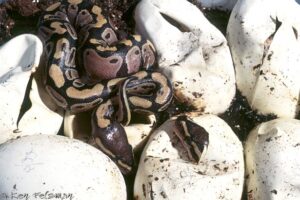Have you ever wondered, can ball pythons eat eggs? Ball pythons have some interesting dietary habits, so it’s a valid question. In this article, we’ll dive into whether eggs are a suitable food choice for ball pythons
Yes, ball pythons can eat eggs, but it’s not a natural part of their diet in the wild. In captivity, some ball python owners offer eggs as an occasional treat. However, eggs should not be a staple food in their diet. If you decide to feed your ball python eggs, make sure they are cooked and never feed them raw eggs.
Nutritional Needs of Ball Pythons

Ball pythons, like all reptiles, have specific nutritional needs that are essential for their health. Here’s a basic overview:
- Prey: Ball pythons are carnivores and primarily eat rodents in the wild. In captivity, they should be fed appropriately sized rodents. The size of the prey should be about the same size as the thickest part of the snake’s body.
- Frequency: Young ball pythons should be fed more frequently than adults. Typically, they are fed every 5-7 days, while adults can be fed every 7-10 days.
- Size of the Meal: The size of the meal should be appropriate for the snake’s size. You want to avoid overfeeding as it can lead to health issues such as obesity.
- Variety: While mice and rats are the primary diet for ball pythons, it’s good to offer variety. This can include different species of rodents and, in some cases, chicks or quail for variety.
- Supplements: While not always necessary if you’re feeding your snake a varied diet, some owners choose to dust prey items with calcium and vitamin supplements to ensure their snake gets all the necessary nutrients.
- Water: Ensure your ball python always has access to clean, fresh water. Water should be changed regularly to prevent bacterial growth.
- Husbandry: Proper husbandry is also essential for the health of your ball python. This includes maintaining appropriate temperatures and humidity levels in their enclosure.
Also, individual ball pythons may have specific dietary requirements or preferences, so it’s always good to monitor your snake’s health and adjust their diet as needed. If you have any concerns about your snake’s health or diet, it’s best to consult with a veterinarian experienced in reptile care.


